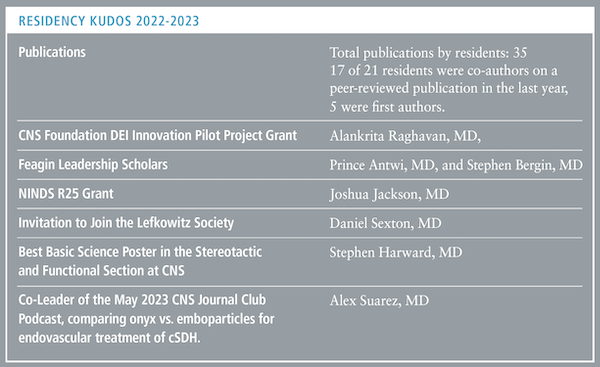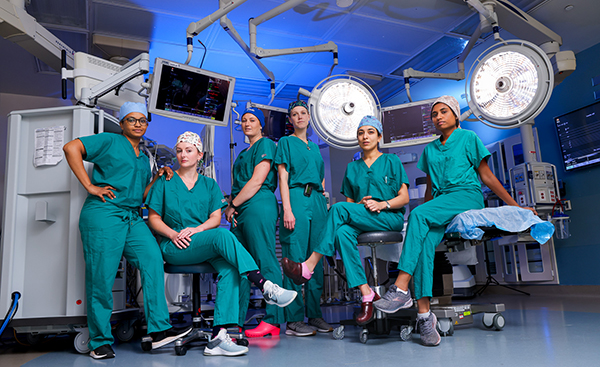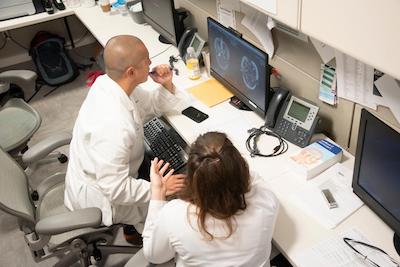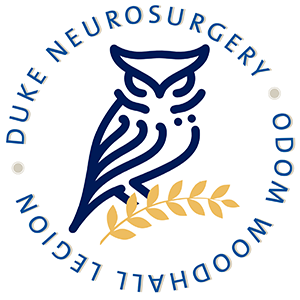Report: Education

A Tradition of Excellence in Education
Duke Neurosurgery’s residency program maximizes trainees’ potential by emphasizing stepwise clinical decision making, technical neurosurgery, mentorship opportunities, continuing education, and interpersonal and communication skills. The program is distinguished by coaching, a novel Surgical Autonomy Program, an elective physician-scientist track, and the opportunity to engage in a robust global health program.
Duke Neurosurgery offers fellowships in spine, endovascular, pediatric neurosurgery, skull base surgery, and global health.


Residency Coaching
This academic year, Duke Neurosurgery Residency implemented a novel coaching program, with specific objectives for trainees at every stage of their residency career.
PGY1
COLLABORATIVE COACHING PROGRAM WITH PSYCHOLOGY INTERNS
This program aims to improve physician well-being and combat burnout by fostering meaningful relationships between psychology interns and neurosurgery residents. It's built on a friendship between a resident and a psychology graduate student, benefiting both as a trained listener and stress management support.
PGY1-4
GROUP COACHING WITH DUKE UNIVERSITY HEALTH SYSTEM COACHES
Group coaching sessions are built into the regular weekly conference time over the course of the academic year. Coaches explore specific themes with junior residents: Building emotional intelligence; dealing with uncertainty; coping with difficult emotions during patient care; and setting goals.
PGY5-7
BUSINESS OF NEUROSURGERY SERIES
Senior residents participate in four workshops on beginning careers as neurosurgeons. Each session is designed to provide practical guidance for navigating early career decisions, with topics that include: Knowing your Value: Negotiating Contracts and Job Interviews; Balancing Research & Clinical Responsibilities; Coding Basics; and How to Select Disability Insurance.
PGY5
CLARIFYING AND ARTICULATING VALUES
As trainees move into senior residency they receive individual and group coaching sessions with an executive coach, in order to step more fully into leadership roles. The focus is on clarifying and articulating their personal values.
PGY6
INDIVIDUAL AND GROUP COACHING FOCUSED ON LEADING TEAMS
During the chief year, more comprehensive executive coaching supports residents in their new leadership roles. In addition, they receive the Reflective Best Self 360 evaluation designed to highlight each resident’s strengths.

The OWL Society
Beginning in the 1950s, when neurosurgeons finished their training at Duke they became members of a group known as the OWL Society (Odom Woodhall Legion), named in honor of two founding fathers of Duke's neurosurgery program — Guy Odom, MD, and Barnes Woodhall, MD. Membership perks included regular meetings and get-togethers and an OWL Society lapel pin.
Eventually, the tradition faded, but Duke Neurosurgery Chair Gerald Grant, MD, is bringing back this society to celebrate Duke Neurosurgery’s legacy, including the more recent past leaders, Drs. Robert Wilkins, Allan Friedman, and John Sampson.
All trainee alumni and former faculty are invited to join current faculty and residents on the Duke campus, September 14-16, 2023, for the first meeting of the “new” society.

All Chapters
Home / Brain / Epilepsy / Cerebrovascular & Skull Base / Pediatric / Chronic Pain / Trauma / Movement Disorders / Brain & Spine Metastasis / Spine / Global / Residency / Top Papers
